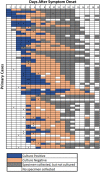Association of Culturable-Virus Detection and Household Transmission of SARS-CoV-2, California and Tennessee, 2020-2022
- PMID: 36705269
- PMCID: PMC10266938
- DOI: 10.1093/infdis/jiad018
Association of Culturable-Virus Detection and Household Transmission of SARS-CoV-2, California and Tennessee, 2020-2022
Abstract
From 2 severe acute respiratory syndrome coronavirus 2 (SARS-CoV-2) household transmission studies (enrolling April 2020 to January 2022) with rapid enrollment and specimen collection for 14 days, 61% (43/70) of primary cases had culturable virus detected ≥6 days post-onset. Risk of secondary infection among household contacts tended to be greater when primary cases had culturable virus detected after onset. Regardless of duration of culturable virus, most secondary infections (70%, 28/40) had serial intervals <6 days, suggesting early transmission. These data examine viral culture as a proxy for infectiousness, reaffirm the need for rapid control measures after infection, and highlight the potential for prolonged infectiousness (≥6 days) in many individuals.
Keywords: SARS-CoV-2; household transmission; secondary infection risk; viral culture.
Published by Oxford University Press on behalf of Infectious Diseases Society of America 2023.
Conflict of interest statement
Potential conflicts of interest. C. G. G. reports grants from Campbell Alliance/Syneos, the National Institutes of Health, the Food and Drug Administration, the Agency for Health Care Research and Quality, and Sanofi-Pasteur; and consultation fees from Pfizer, Merck, and Sanofi-Pasteur. J. R. S. reports support from Roche Diagnostics. All other authors report no potential conflicts. All authors have submitted the ICMJE Form for Disclosure of Potential Conflicts of Interest. Conflicts that the editors consider relevant to the content of the manuscript have been disclosed.
Figures

Comment in
-
The Continuing Puzzle of Defining Duration of Severe Acute Respiratory Syndrome Coronavirus 2 Infectivity.J Infect Dis. 2023 Jun 15;227(12):1339-1342. doi: 10.1093/infdis/jiad019. J Infect Dis. 2023. PMID: 36705262 No abstract available.

